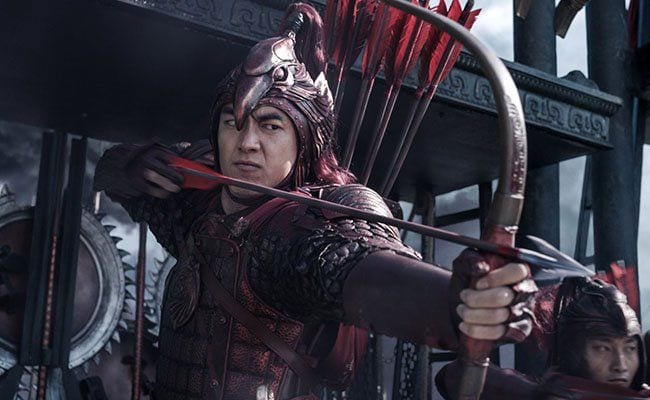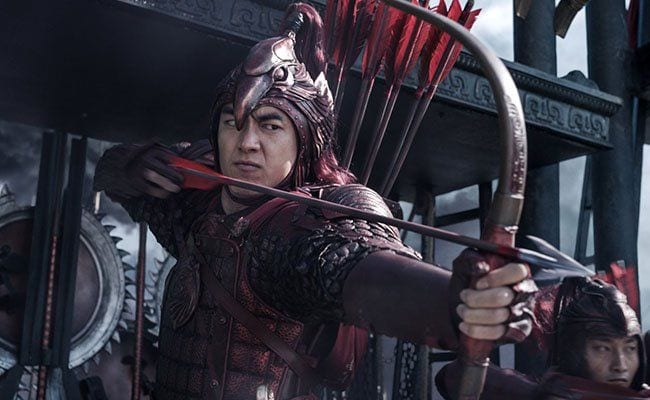
In case there was still a debate about the incompatibility of classical costume dramas and goofy monsters, The Great Wall puts those doubts to rest. Director Yimou Zhang provides a few spectacular flourishes and some lavish set pieces, but this is a brutally serious affair that traps fun on the wrong side of the wall.
William (Matt Damon) is a man with no home. Damon’s peculiar dialect, at first, seems like a clumsy Daniel Day Lewis impersonation, but once you realize this grizzled mercenary has marched under the flags of every bishop, king, and Pope across Europe, his lack of an accent begins to make sense. It’s a rich backstory that might have evolved into a battle of conscience for a man with no allegiances who’s suddenly confronted by unfamiliar feelings of duty and loyalty. In the service of The Great Wall, however, it’s little more than a fancy anecdote to charm the film’s suspicious heroine, Commander Lin (Tian Jing), into giving him some food.
Six months ago, William set across Asia in search of the ‘black powder. “It’s the weapon of our dreams!” proclaims William’s conniving and oddly lovable sidekick Tovar (Pedro Pascal). Tovar is the kind of secondary character who exists only to make wisecracks and conveniently save the lead character from certain annihilation. The two thieves blunder across ancient China, evading bandits and murdering a nondescript monster that looks like something out of H.R. Giger’s Kindergarten sketch book.
It should come as no shock that The Great Wall is a bad movie — the trailers betray this secret in about ten seconds — but the lack of genuine discovery or originality is truly shocking. As evidenced by his arresting epics Hero and House of Flying Daggers, Zhang is a director capable of visual wizardry and imagination. We see glimpses of this mastery when William and Tovar first arrive at The Great Wall. Thousands of brightly adorned soldiers march across the Wall as far as the eye can see. Watchtowers launch flaming ammunition as dainty female assassins dangle from treacherous platforms and fire spears into the melee below.
These introductory scenes also provide the film’s most startling set piece, as Zhang takes us into the bowels of the Wall. Slaves in the basement dungeon turn massive wooden turbines, their water power sending provisions and personnel upward to the next level, where soldiers ready barbaric weapons with spinning blades and exploding firepots. Finally, atop the Wall, a drum corps announces the arrival of their monstrous enemy, the Tao Tei, and signals each strategic battle maneuver with a new drumming rhythm. It’s the sort of chaotic spectacle you would expect from the man who directed the 2008 Beijing Olympics with such distinction.
Sadly, these fleeting pleasures are wasted in what is an otherwise derivative mess. Nearly everything here draws its inspiration from other sources, including battle scene aesthetics that borrow heavily from The Two Towers and the muddled, computer-generated critters reminiscent of Starship Troopers. The Tao Tei are even led by an all-powerful queen, which makes William and Commander Lin’s quest to destroy her an exact duplication of Tom Cruise and Emily Blunt’s objective in Edge of Tomorrow. Someday, hopefully, screenwriters will stop relying upon the lazy conceit that drones are defenseless without the direction of their queen.
Even more baffling than the lack of imagination is the complete absence of fun. The scenes between William and Tovar share a playful camaraderie that might lead to misadventure were they not immediately separated upon their arrival at the Wall. William begins the laborious task of character rehabilitation by flirting with Commander Lin, while Tovar spends his time plotting an escape with the imprisoned ex-patriot, Ballard (a completely squandered Willem Dafoe). When the Tao Tei finally arrive and the carnage begins, it’s all slow-motion buffoonery and videogame nonsense. For a horde of deadly monsters that return to terrorize China every 60 years, the Tao Tei are surprisingly boring foes. They can climb and they can dig… that’s about it.
In fact, the failure of the monster storyline is what dooms The Great Wall. The dramatic scenes work well enough, such as Commander Lin imploring William to take a blind leap of faith from the Wall’s edge in order to prove his allegiance. Zhang is adept at using these romantic elements to showcase his bold visual style. When it comes to the monster action, however, these fantastical elements clash badly with the dour sensibility of this mannered world. While it may be mesmerizing to watch refracted light playing through an immaculate tower of stained glass windows, it’s not particularly exciting to watch giant insects crashing through the glass. When mindless monsters could easily be replaced by human soldiers with the capacity and potential for real dramatic development, the monster ploy to generate box office interest is glaringly obvious.
Those enraged over the casting of an American actor to lead the predominantly Asian ensemble will be delighted to learn that Damon’s presence only becomes an insulting distraction in the film’s final five minutes. In fact, The Great Wall strives to indict the selfish consumerism that defines Western culture. It’s a worthwhile topic that deserves a more thoughtful treatment than giant monsters and co-opted national monuments can provide.


![Call for Papers: All Things Reconsidered [MUSIC] May-August 2024](https://www.popmatters.com/wp-content/uploads/2024/04/all-things-reconsidered-call-music-may-2024-720x380.jpg)



